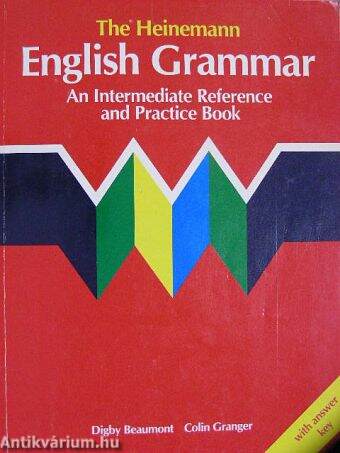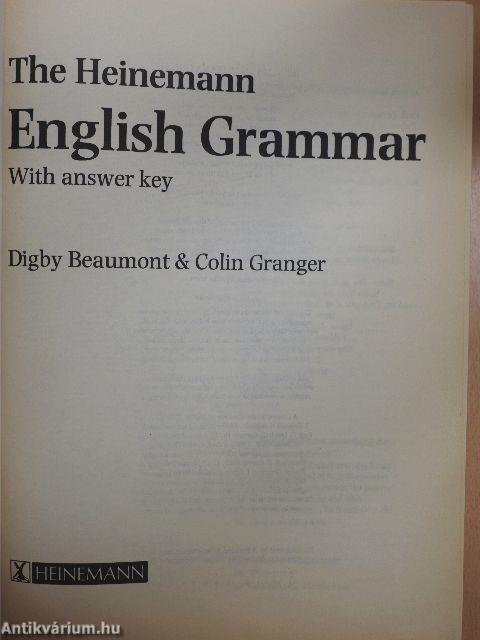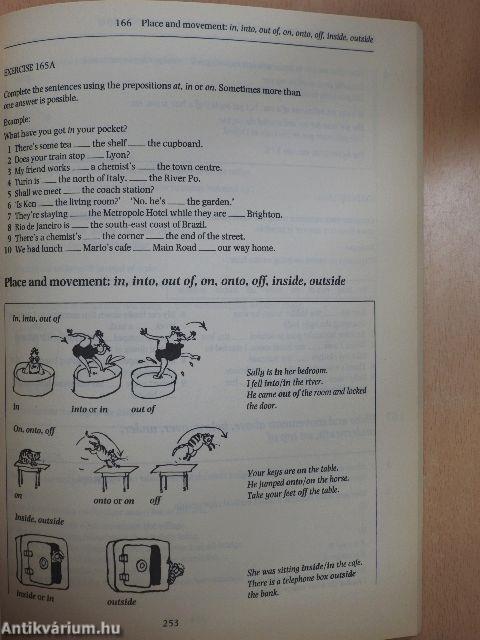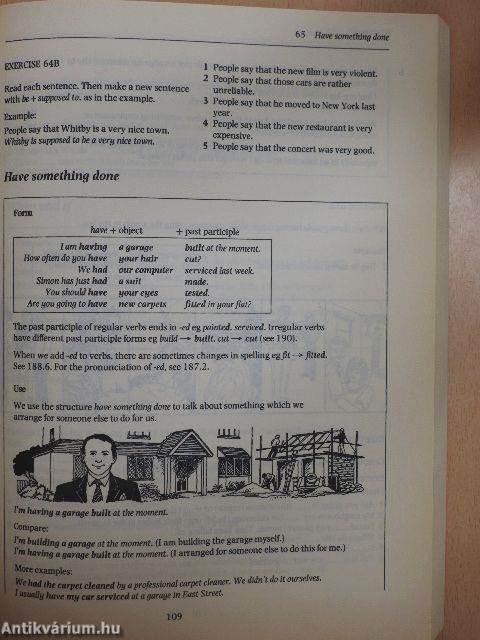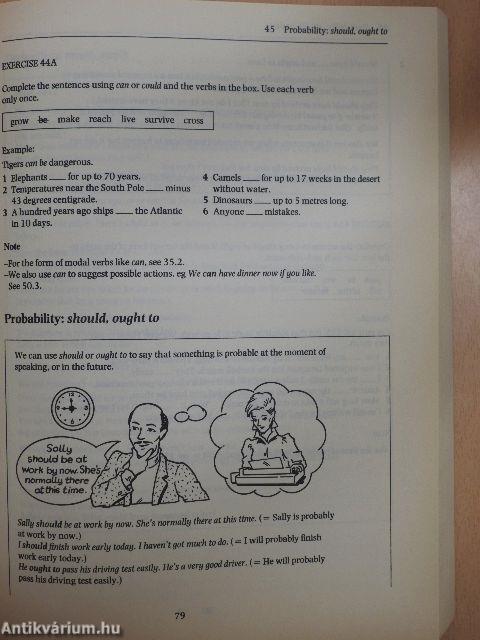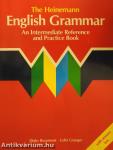1.067.339
kiadvánnyal nyújtjuk Magyarország legnagyobb antikvár könyv-kínálatát

VISSZA
A TETEJÉRE
JAVASLATOKÉszre-
vételek
The Heinemann English Grammar
Angol nyelvtan haladók számára - An Intermediate Reference and Practice Book
| Kiadó: | Heinemann Educational Books Ltd |
|---|---|
| Kiadás helye: | Oxford |
| Kiadás éve: | |
| Kötés típusa: | Ragasztott papírkötés |
| Oldalszám: | 320 oldal |
| Sorozatcím: | |
| Kötetszám: | |
| Nyelv: | Angol |
| Méret: | 25 cm x 19 cm |
| ISBN: | 0-435-2836-4-2 |
| Megjegyzés: | Fekete-fehér illusztrációkkal. |
naponta értesítjük a beérkező friss
kiadványokról
naponta értesítjük a beérkező friss
kiadványokról
Fülszöveg
A Heinemann-féle angol nyelvtankönyv egy teljes mértékben egységes nyelvtani és gyakorló kézikönyv, az angol nyelvtan megértéséhez és gyakorlásához, akár egyedüli akár osztálytermi használatra. Elsősorban középfokú nyelvtudással rendelkezők számára készült, de hasznos lehet alacsonyabb vagy magasabb szinten álló tanulók számára is. A nyelvtani magyarázatok egyszerűek és áttekinthetőek.A könyvhöz megoldókulcs is tartozik.
Tartalom
| Introduction | |
| Verbs | |
| Present continuous | 1 |
| Present simple | 2 |
| Present continuous and present simple | 3 |
| Past simple | 4 |
| Past continuous | 5 |
| Present perfect simple | 6 |
| Gone and been | 4 |
| Present perfect with just, yet and already | 8 |
| Present perfect continuous | 9 |
| Present perfect continuous and present perfect simple | 10 |
| Present perfect with for and since | 11 |
| Present perfect and past simple | 12 |
| Present perfect and present tense | 13 |
| Past perfect simple | 14 |
| Past perfect continuous | 15 |
| Future: will | 16 |
| Future: going to | 17 |
| Future: will and going to | 18 |
| Present continuous for the future | 19 |
| Future: present continuous and going to | 20 |
| Present simple for the future | 21 |
| Present simple for the future after when if, etc | 22 |
| Future continuous: will be + -ing form | 23 |
| Future perfect: will have + past participle | 24 |
| Future in the past: was/were going to | 25 |
| Continuous forms with always | 26 |
| Verbs not normally used in the continuous | 27 |
| Review of the present and the past | 28 |
| Review of the future | 29 |
| Imperative and let's | 30 |
| Be | 31 |
| There is, there are | 32 |
| Have and have got | 33 |
| Have for actions | 34 |
| Modal verbs and related structures | |
| Modal verbs: general | 35 |
| Ability: can, could, be able to | 36 |
| Permission: can, could, may, might, be allowed to | 37 |
| Obligation and necessity (1): must, have to, have got to | 38 |
| Obligation and necessity (2): mustn't, don't have to, don't need to, haven't got to, needn't | 39 |
| Review of permission and obligation: can, can't, must, mustn't, needn't be allowed to, have to, don't have to | 40 |
| Needn't have and didn't need to | 41 |
| Obligation and advice: sould, ought to, had better, be supposed to, shall | 42 |
| Possibility: may, might, could | 43 |
| Possibility: can | 44 |
| Probability: should, ought to | 45 |
| Deduction: must, can't | 46 |
| Review of possibility, probability and deduction: may, might, could, should, ought to, must, can't | 47 |
| Requests: can, could, may, will, would | 48 |
| Offers: willl, shall, can, could, would | 49 |
| Suggestions: shall, let's, why don't we? how/what about? can, could | 50 |
| Habits: used to, will, would | 51 |
| Refusals: won't, wouldn't | 52 |
| Promises and threats: will | 53 |
| May/might as well | 54 |
| Other uses of should | 55 |
| Wish and if only | 56 |
| Would rather | 57 |
| It's time | 58 |
| The passive and have something done | |
| The passive: general | 59 |
| The passive: infinitive and -ing forms | 60 |
| Using get instead of be in the passive | 61 |
| Verbs with two objects in the passive | 62 |
| The passive with by and with | 63 |
| It is said that he.../He is said to... etc | 64 |
| Have something done | 65 |
| If sentences, conditionals | |
| When and if | 66 |
| Conditionals: introductions | 67 |
| Open present or future conditionals | 68 |
| Unreal present or future conditionals | 69 |
| Open and unreal present or future conditionals | 70 |
| Unreal past conditionals | 71 |
| General conditionals | 72 |
| Conditionals without if | 73 |
| Review of conditionals | 74 |
| Reported speech | |
| Direct and reported speech: introduction | 75 |
| Say and tell | 76 |
| Reported statements | 77 |
| Reported questions | 78 |
| Using the to infinitive in reported speech | 79 |
| Review of reported speech | 80 |
| -ing form and infinitive | |
| -ing form: participle or gerund | 81 |
| Verb + -ing form or infinitive: introduction | 82 |
| Verb + -ing form | 83 |
| Verb + to infinitive | 84 |
| Verb + question word + to infinitive | 85 |
| Verb + object + to infinitive | 86 |
| Verb + -ing form or to infinitive (1) | 87 |
| Verb + -ing form or to infinitive (2) | 88 |
| Be used to + -ing form and used to + infinitive | 89 |
| Need + -ing form or to infinitive | 90 |
| Infinitive without to | 91 |
| Preposition + -ing form | 92 |
| Person + -ing form | 93 |
| -ing form and to infinitive as subjects | 94 |
| To infinitive of purpose | 95 |
| Noun/Pronoun/Adjective + to infinitive | 96 |
| See someone doingn and see someone do, etc | 97 |
| Review of -ing form and infinitive | 98 |
| Participle (-ing and -ed) adjectives | 99 |
| Participle (-ing) clauses | 100 |
| Nouns, articles and quantity | |
| Singular and plural nouns (1) | 101 |
| Singular and plural nouns (2) | 102 |
| Compound nouns | 103 |
| Possessive 's (genitive) | 104 |
| Possessive 's or ...of...? | 105 |
| Double possessive | 106 |
| Countable and uncountable nouns | 107 |
| Articles: a/an and the | 108 |
| Talking in general: no article and a/an | 109 |
| Talking in general: the | 110 |
| Common expressions without articles | 111 |
| Place names with and without the | 112 |
| Review of a/an and the | 113 |
| Quantity: general | 114 |
| Some and any | 115 |
| Much, many, a lot of, (a) little, (a) few | 116 |
| No and none | 117 |
| All, every, everybody, everything, whole | 118 |
| Both, either, neither | 119 |
| Pronouns | |
| Personal pronouns | 120 |
| Possessive adjectives and pronouns | 121 |
| Reflexive pronouns | 122 |
| Review of personal pronouns, possessive adjectives and pronouns and reflexive pronouns | 123 |
| One(s) | 124 |
| Something, anything, somebody, anybody, etc | 125 |
| Adjectives | |
| Form, position and order of adjectives | 126 |
| Comparative and superlative adjectives | 127 |
| As...as | 128 |
| Review of comparatives, superlatives and as...as | 129 |
| Adverbs | |
| Adjectives and adverbs of manner | 130 |
| Adverbs of manner, place and time | 131 |
| Adverb position with verbs | 132 |
| Time: still, yet, already | 133 |
| Time: any more, any longer, no longer | 134 |
| Adverbs of frequency | 135 |
| Adverbs of probability | 136 |
| Fairly, quite, rather and pretty | 137 |
| Too and enough | 138 |
| So and such | 139 |
| Comparison: adverbs | 140 |
| Negatives, questions and answers | |
| Negative statements | 141 |
| Yes/No questions | 142 |
| Wh- questions | 143 |
| Subject and object questions | 144 |
| Question words | 145 |
| Negative questions | 146 |
| Question tags | 147 |
| Reply questions | 148 |
| Indirect questions | 149 |
| Short answers | 150 |
| So/neither am I, so/neither do I, so/neither can I, etc | 151 |
| I think so, I hope so, I expect so, etc | 152 |
| Relative clauses | |
| Defining relative clauses with who, that and which | 153 |
| Leaving out who, that and which in defining relative clauses | 154 |
| Defining relative clauses with whose, where, when and why/that | 155 |
| Defining and non-defining relative clauses | 156 |
| Non-defining relative clauses with whose, whom, where and when | 157 |
| Relative clauses with prepositions + which and whom | 158 |
| Which referring to a whole clause | 159 |
| Linking words | |
| Time: when, as, while, as soon as, before, after, until | 160 |
| Contrast: although, even though, though, in spite of, despite, while, whereas, however | 161 |
| Reason and result: because (of), as, since, so, as a result, therefore, so/such ... (that) | 162 |
| Purpose: to, in order to, so as to, for, so that | 163 |
| Purpose: in case | 164 |
| Prepositions | |
| Place: at, in, on | 165 |
| Place and movement: in, into, out of, on, onto, off, inside, outside | 166 |
| Place and movement: above, below, over, under, underneath, on top of | 167 |
| Other prepositions of place and movement | 168 |
| Time: at, in, on | 169 |
| On time and in time | 170 |
| At the end and in the end | 171 |
| Time: in, during, for, while | 172 |
| Time: by, until, from, to before, after | 173 |
| Time: for, since, ago, before | 174 |
| Means of transport: by, on, in | 175 |
| Like, as and as if | 176 |
| With (=having) and in (=wearing) | 177 |
| Adjective + preposition | 178 |
| Noun + preposition | 179 |
| Preposition + noun | 180 |
| Verb + preposition | 181 |
| Verb + object + preposition | 182 |
| Review of prepositions | 183 |
| Indirect objects with or without to and for | 184 |
| Phrasal verbs | |
| Phrasal verbs: introduction | 185 |
| Types of phrasal verbs | 186 |
| Pronunciation and spelling of endings | |
| Pronunciation of endings: -(e)s and -ed | 187 |
| Spelling of endings: -(e)s, -ing, -ed, -er, -est, -ly | 188 |
| General | |
| Contractions | 189 |
| Irregular verbs | 190 |
| Appendix: American English | |
| Glossary | |
| Index |
Témakörök
- Idegennyelv > Idegennyelvű könyvek > Angol > Pedagógia
- Idegennyelv > Idegennyelvű könyvek > Angol > Nyelvészet
- Pedagógia > Tantárgypedagógia > Idegen nyelv > Angol
- Nyelvészet > Idegen nyelvek > Tanulása
- Nyelvészet > Idegen nyelvek > Nyelvtana
- Idegennyelv > Nyelvtanulás > Nyelvtanítás > Nyelvkönyv
- Idegennyelv > Nyelvtanulás > Nyelvtanítás > Oktatási nyelv > Idegennyelvű
- Idegennyelv > Nyelvtanulás > Nyelvek > Angol > Leíró nyelvtan
- Idegennyelv > Nyelvtanulás > Nyelvek > Angol > Tanfolyamok > Középfok



